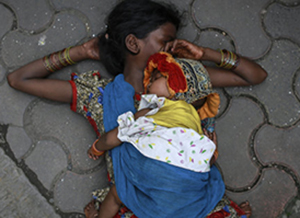New Delhi, Sep 28; The National Human Rights Commission has issued a notice to Madhya Pradesh government over reported deaths of 116 children due to malnutrition-related ailments in Sheopur district in the last five months.

The NHRC has issued the notice to the Chief Secretary of the state and sought a detailed report on the matter within four weeks.
The Commission has taken suo motu cognisance of media reports that 116 children have died due to malnutrition related ailments in Sheopur district.
"The Chief Medical Officer has reportedly accepted these facts. Three Nutrition Rehabilitation Centres in the district are overcrowded and lack in facilities as well as doctors," the NHRC said in a statement today.
The Commission has observed that the content of media reports are "distressing" and a "matter of concern" as these indicate towards "violation of human rights of children" due to malnutrition and lack of health care by the state, it says.
The Commission has also pointed out that "it has been emphasising at every platform for proper implementation of government schemes, including ICDS, which provide for supplementary nutrition for both lactating mothers and children," the statement adds.
"It is the duty of the state to ensure that young children are not deprived of proper nutritious and balanced diet. Right to Food and Right to Health are indispensable for the exercise of other human rights. The state has to promote, protect and preserve the health of all individuals, especially the infants and young children," it said.
The NHRC further said that reportedly, "children are forced to sleep on the floor at the Nutrition Rehabilitation Centres as there are no beds available for them."
"Many children, suffering from malnutrition, are not being attended by the doctors for hours. The District Collector of Sheopur has stated that they have called doctors from the other district to attend to them. Due to overcrowding and lack of basic hygiene, the hospitals have also become prone to infection," it said.








Comments
Add new comment